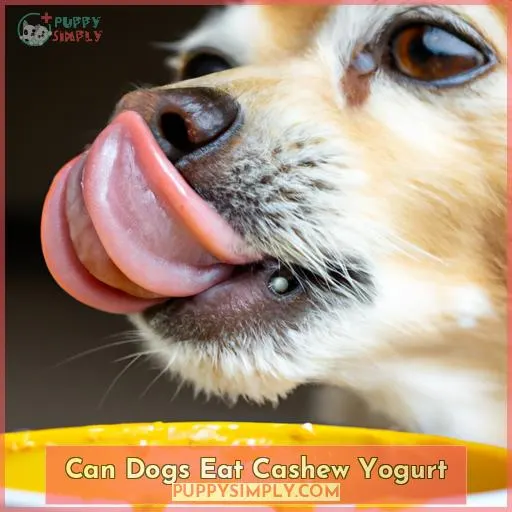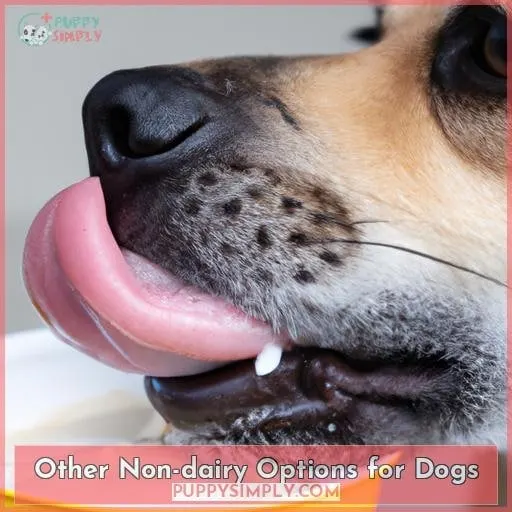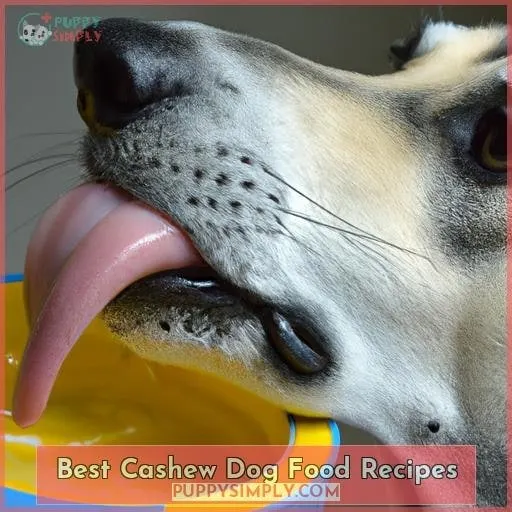This site is supported by our readers. We may earn a commission, at no cost to you, if you purchase through links.
Yes, dogs can eat cashew yogurt in small amounts as an occasional treat. It’s generally safe, but make sure it’s plain and free from harmful ingredients like sugar or artificial sweeteners. Moderation is key—too much can cause digestive issues.
Always consult your vet before introducing new foods to your dog’s diet.
If you’re exploring non-dairy options, consider nut milk or coconut yogurt, which might be gentler on their stomach. For a bit of variety in your dog’s meals, cashew-based recipes could be a hit.
Stick around to discover more alternatives and recipes that will keep your furry friend’s tail wagging.
Table Of Contents
- Overview
- Can Dogs Eat Cashew Yogurt Safely?
- Other Non-dairy Options for Dogs
- Best Cashew Dog Food Recipes
- Best Dog Foods With Cashews
- Frequently Asked Questions (FAQs)
- What are the symptoms of dairy allergies in dogs?
- Are there any other health benefits associated with cashew yogurt for dogs?
- How much cashew yogurt should be given to a dog per day?
- Are there any other dairy-free alternatives to cashew yogurt for dogs?
- Does cashew yogurt contain any artificial sweeteners or preservatives?
- Conclusion
Overview

Cashew yogurt is a popular dairy-free alternative, but it is essential to check with a veterinarian before giving any new food product to pets.
Importance of Pet Diet
We understand how important it is to maintain a balanced diet for our beloved pets, and that’s why we must be extra careful when introducing them to new foods. Raw diets, grain-free options, pet nutrition guidelines, and vegan pet food are all considerations when determining the best dietary plan for your furry family member.
It’s essential to consult with a veterinarian before making any significant changes to ensure optimal health through proper nutrition. Balancing protein sources, such as lean meat or fish, with carbohydrates like brown rice or sweet potatoes will provide your pup with quality nutrients while avoiding unnecessary fillers like cornmeal or wheat flour, which can easily cause an upset stomach leading to vomiting and diarrhea.
Knowing what ingredients are safe (or not) in dairy alternative products before giving them as treats is also very important. Chocolate, macadamia nuts, and avocado should all be avoided due to their potential toxicity levels.
With these precautions taken into account, you can rest assured knowing that you’re providing only the best care possible for your four-legged friend!
Can Dogs Eat Cashew Yogurt Safely?

Cashew yogurt may contain added sweeteners, vitamins and minerals, emulsifiers and stabilizers which should be avoided when feeding it to pets. Therefore, it is essential to check the full ingredient list carefully before giving cashew yogurt or any other dairy-free product to your dog.
Ingredients to Avoid
We want to make sure we take all the necessary precautions when introducing our pets to new foods, so it’s important to be aware of potentially harmful ingredients and avoid them. This is especially relevant when considering a dairy-free diet for dogs as certain raw diets, vegan diets, or food allergies may require this change.
In addition, calcium levels and dental health can also benefit from a non-dairy alternative such as cashew yogurt. However, there are some ingredients that should always be avoided in order for the pet’s safety.
These include chocolate, macadamia nuts, and avocado due to their potential toxicity in animals.
Now that we know what not to do with regards to giving non-dairy products like cashew yogurts safely to our furry friends, let us move on into how moderation plays an important role here too.
Moderation is Key
We should always remember to feed our pets non-dairy foods like cashew yogurt in moderation, as too much can lead to digestive issues such as vomiting and diarrhea in some cases.
Here are a few important tips when it comes to feeding our furry friends dairy alternatives:
- Monitor portion sizes – Make sure that the amount of food given is appropriate for your pet’s size and energy level.
- Consider bone health – Dairy alternatives may not provide enough calcium or other minerals needed for healthy bones, so supplement with quality dog food fortified with vitamins and minerals if necessary.
- Take flavor preferences into account – Some dogs may be picky eaters who prefer certain flavors over others, so experiment until you find one they love!
- Be aware of potential digestion problems – If your pet has any existing digestive issues or sensitivities, keep an eye out for signs of discomfort after eating dairy alternative products.
Moderation is key when it comes to feeding non-dairy options like cashew yogurt because even though there are possible health benefits associated with them, overindulging could cause unpleasant side effects such as upset stomachs and diarrhea for some animals depending on their individual physiology.
Consult With a Veterinarian
We should always consult with our veterinarian before making any significant changes to our pet’s diet, including introducing new foods like cashew yogurt. A qualified professional can provide important advice on the best raw diets or vegan options for pets based on their individual nutritional requirements and health concerns such as allergies.
Pet owners should also heed the feeding guidelines that are provided by their veterinarians in order to ensure that their pets get all of the necessary vitamins and minerals they need for optimal health.
Additionally, consulting a veterinarian can help detect underlying medical issues or sensitivities that may be exacerbated by certain ingredients found in non-dairy products such as nuts, cereal grains, legumes seeds, chocolate macadamia nuts, and avocado which could cause serious harm if ingested by your pet.
By speaking with an experienced vet prior to making any dietary modifications for your furry friend, you’ll have peace of mind knowing you’re doing everything possible to keep them safe while still providing them with balanced nutrition tailored specifically towards meeting their particular needs!
Other Non-dairy Options for Dogs

Nut Milk
We can provide our furry friends with a healthy and nourishing alternative to dairy milk by offering them nut milks like almond, coconut, or even macadamia! Nut milks are typically derived from organic sources which makes them not only healthier for pets but also minimizes the risk of allergies.
They contain many important nutrients that contribute to their overall nutritional value such as protein, fiber, and essential fatty acids. When selecting nut milk for your pet, it’s important to choose one that provides the right nutritional balance so they get all the necessary vitamins and minerals they need.
Additionally, look at labels carefully as some brands may be fortified with calcium content which can help improve bone health in dogs. With careful consideration, you can offer an alternative source of nutrition without compromising quality or safety standards set forth by vets or APCC guidelines.
All-in-all, nut milk is a great option when looking for something different than traditional dairy options.
Coconut Yogurt
We can provide our furry friends with a delicious and nutritious dairy alternative by offering them coconut yogurt! Coconut yogurt provides many health benefits for dogs, as it contains several important vitamins and minerals.
It’s also rich in proteins, which help maintain strong muscles and bones, making it an ideal snack for active pups.
In addition to the nutritional value of coconut yogurt, there are digestive benefits that come from eating this food item as well. The probiotics found in some brands of non-dairy yogurts can aid digestion while increasing nutrient absorption when consumed regularly.
Furthermore, many dogs find the taste of coconut yogurt preferable over other types of dairy alternatives due to its natural sweetness without added sugar or artificial sweeteners like xylitol, which should be avoided at all costs! Eating only small amounts will not only satisfy their taste preferences but may also help control weight gain if monitored closely by owners or veterinarians alike.
Moving forward with caution, however, introducing any new food into your pet’s diet should always be discussed first between you and a veterinarian before serving so potential allergies are taken into consideration along with any dietary restrictions that need addressing prior to consumption.
Plant-based Cheese
We’re excited to explore the world of plant-based cheese, which is sure to knock our socks off with its delicious taste that’s out of this world!
Plant-based substitutes for cheese have become increasingly popular due to allergies, vegan or plant-based diets, and health benefits. Store-bought options often contain fortified vitamins and minerals as well as emulsifiers and stabilizers.
It’s important to note that some products may also contain added sweeteners such as xylitol, which can be toxic in dogs. So, it’s best practice when shopping for dairy alternatives, always read the full ingredient list before giving them a try.
Allergy risks are another factor worth taking into consideration. If there are any doubts about ingredients, consult a veterinarian first before making changes in your pet’s diet plan.
With all these considerations taken into account, we feel confident exploring the exciting realm of plant-based cheeses! Taking proper precautions will ensure both you and your pup enjoy their tasty treats safely from now on – without sacrificing any flavor along the way!
Best Cashew Dog Food Recipes

All these dishes contain ingredients that are both safe for pups to eat while also being nutritious additions to their meals.
Cashew and Chicken Recipe
Let’s tantalize our taste buds and give an extra boost of nutrition to our furry friends with this delicious cashew and chicken recipe! The benefits of adding cashews to a dog’s diet are numerous. Cashews provide essential vitamins, minerals, fiber, antioxidants, healthy fats, and protein that can help keep dogs happy and healthy.
Additionally, they have a lower fat content than many other nuts, so they’re easy for dogs to digest.
Furthermore, the high nutritional value makes it ideal for supplementing meals or creating novel ingredients in homemade recipes. When feeding your pet this delicious dish, it’s important to consider some safety tips when introducing new foods into their diet.
Take small steps by slowly mixing the food in over time so you don’t trigger any allergies or digestive issues that could be caused by sudden changes in their food intake.
It’s also important not to use too much salt or sugar as these types of seasonings can be harmful if ingested in large amounts.
Cashew and Sweet Potato Recipe
We’re serving up a tasty treat for our furry friends with this scrumptious sweet potato and cashew dish – much like the old adage, ‘good things come in small packages’! Homemade recipes are great to provide your pup with fresh meals that you can tailor to meet their nutritional needs.
This particular recipe is full of nutrition, as well as proteins from both the cashews and sweet potatoes. It’s important to consider any allergies or sensitivities before giving this recipe to your pet so it’s best practice if they’ve never had these ingredients before, test them out on a smaller scale first.
This nutritious combination has plenty of health benefits for pups. Essential vitamins, such as vitamin A from the sweet potato, help maintain healthy eyesight and support immunity. Vitamin B6 found in cashews help process amino acids. Fiber and potassium are two key minerals also found within these ingredients which support heart health and regular digestion respectively.
The protein sources ensure sustained energy throughout daily activities while providing an additional boost when needed post-exercise too! Allergies consideration must be taken into account, so please take care when introducing new foods, especially those containing dairy alternatives such as cashew yogurt, into Fido’s diet.
With its high nutritional value, making food at home using simple recipes like this one ensures you know exactly what goes into each mealtime snack or dinner option.
Cashew and Pumpkin Recipe
We’re excited to present this delicious, nutritious combination of cashews and pumpkin that’s sure to please your pup! This alternative treat is a great option for vegan diets or those with allergies concerns.
Cashew yogurt provides plenty of protein sources, making it an ideal nut-based snack for dogs. Pumpkin also adds fiber and essential vitamins like beta carotene which helps support vision health.
This recipe is simple: just mix together one cup plain cashew yogurt with ¼ cup cooked pumpkin puree in a bowl until fully combined.
However you choose to serve it up, this combination of cashews and pumpkin makes an excellent nutritional snack perfect for any pooch who loves treats but still needs their nutrition too!
Best Dog Foods With Cashews

Blue Buffalo Life Protection Formula With Cashews has an optimal balance of omega 3 & 6 fatty acids that helps support healthy skin and coat in dogs, plus it features antioxidant rich ingredients like blueberries and cranberries! Lastly, Canidae All Life Stages With Cashews provides premium nutrition from fresh meats such as chicken meal along with healthful grains including brown rice which makes this food perfect for all life stages.
Wellness Core Rawrev Grain-free Recipe With Cashews
We can’t help but be impressed by Wellness Core Rawrev Grain-free Recipe With Cashews. It’s a delicious combination of crunchy cashews and wholesome pumpkin that’s sure to tantalize our furry friends’ taste buds.
This dog food has some serious health benefits as it’s packed with essential vitamins and minerals, helping to reduce the risk of digestive issues or nutritional deficiencies in your pet.
Additionally, cashew yogurt provides a source of healthy fats which are important for overall wellbeing. However, you should always consult your veterinarian before introducing anything new into your pup’s diet as there may be allergy risks or possible risks associated with overfeeding this type of product.
All in all though, Wellness Core Rawrev Grain-free Recipe With Cashews could provide an excellent addition to any pup’s meal plan!
Blue Buffalo Life Protection Formula With Cashews
We’re loving Blue Buffalo’s Life Protection Formula With Cashews for our pup – it’s packed with crunchy cashews and other wholesome ingredients that provide essential vitamins and minerals.
Not only are they a delicious addition to any meal, but they also boast some impressive health benefits. Cashew benefits include being an excellent source of magnesium, which helps support strong bones; copper, which is beneficial in regulating cholesterol levels; zinc for healthy coat growth; iron to help keep the immune system functioning well; as well as Vitamin B-6 needed for proper brain development.
Additionally, cashew nutrition offers a great range of antioxidants that can protect against cell damage from free radicals while providing anti-inflammatory properties too! Plus, there’s no need to worry about allergies – unlike wheat or dairy products such as yogurt, most dogs don’t have any known sensitivity or intolerance issues when it comes to consuming cashews!
The rich nutty flavor is sure to satisfy even picky eaters with its smooth texture and mild taste – perfect if you’re looking for something special on your pup’s plate but without compromising their nutritional needs either!
Preparation couldn’t be easier too: simply mix into kibble dishes or serve alone as tasty treats throughout the day.
Canidae All Life Stages With Cashews
We’re thrilled to try Canidae All Life Stages With Cashews, a scrumptious blend of crunchy cashews and healthy ingredients that promises to tantalize our pup’s taste buds while providing essential nutrients.
This food is specifically designed for dogs of all life stages from puppies through seniors, which makes it an ideal choice for multi-pet households.
Additionally, the addition of cashew nuts brings several beneficial qualities such as making cashew treats that are easy on your dog’s stomach, providing important vitamins and minerals in the form of dietary supplements, reducing allergies due to its high fat content, and extending shelf life by proper storage at room temperature.
The combination of these factors make Canidae All Life Stages a great option when considering what type nutrition you should give your pet.
Frequently Asked Questions (FAQs)
What are the symptoms of dairy allergies in dogs?
We understand how important it is to keep your furry friend healthy and happy, so we’re here to help you identify the signs and symptoms of dairy allergies in dogs.
Allergy testing can be used as a diagnostic tool for identifying which foods are causing an adverse reaction in your pup, but there are some common indicators that should raise suspicion of a potential dairy allergy.
Symptoms such as skin irritation or redness, gastrointestinal upset with vomiting or diarrhea after consuming dairy products, coughing or sneezing fits due to inhalation of milk proteins from aerosolized particles may all be associated with a possible allergy.
If any of these signs appear accompanied by excessive scratching/licking at paws or around face then this could further suggest food intolerances including those related to cow’s milk consumption by pets.
Prevention strategies include avoiding exposure altogether if known sensitivities exist; however dietary alternatives like nut-based yogurt can provide additional nutrition when given appropriately under veterinary supervision following diagnosis tips established through careful investigation into individual characteristics specific for each pet patient!
Are there any other health benefits associated with cashew yogurt for dogs?
We all know that feeding our beloved furry friends healthy snacks is an important part of caring for them. One way to do this is with cashew yogurt. Not only can it provide valuable probiotics benefits to help support a healthy gut, but it may also be beneficial in helping dogs who are on raw or vegan diets get the nutrition they need.
Homemade recipes are often recommended as these’ll have fewer added ingredients than store-bought options. When giving your pup cashew yogurt, make sure you read the full ingredient list first.
Cashew yogurt could also serve as a tasty treat when mixed with other healthy ingredients like fruits or vegetables.
How much cashew yogurt should be given to a dog per day?
We all want what’s best for our furry friends, and homemade cashew yogurt is a great way to provide nutritional benefits while still following feeding guidelines. Cashew yogurt is a milk alternative that provides natural sweeteners as well as other nutritional benefits without the drawbacks of dairy products.
However, it’s important to know how much cashew yogurt should be given per day in order to ensure your pet enjoys its many healthful advantages with no risk of harm or discomfort.
Generally speaking, dogs should only consume small amounts of this delicious treat each day – typically around one teaspoon per 20 pounds – making sure not to overfeed them or exceed their recommended daily caloric intake.
Are there any other dairy-free alternatives to cashew yogurt for dogs?
We’ve all heard of cashew yogurt as a dairy-free alternative for our furry friends, but did you know there are plenty of other options to choose from?
Soy yogurt is a great source of protein and contains fewer calories than most other yogurts.
Oat milk has become increasingly popular in recent years due to its creamy texture and nutty flavor; it’s also packed with essential vitamins and minerals.
Almond milk is another delicious option that can be used in smoothies, baking recipes, or even served on its own.
Lastly, pea protein powder can be added to any meal for an extra boost of nutrition – just make sure your pup isn’t allergic before feeding them this tasty treat!
With so many alternatives available out there, you’re bound to find the perfect fit for your pet’s unique dietary needs.
Does cashew yogurt contain any artificial sweeteners or preservatives?
We, at APCC, often get asked if dairy-free alternatives are safe for pets. One such product is cashew yogurt – a popular dairy alternative derived from nuts. It can be an excellent source of nutrients and health benefits but also has some potential allergy risks to consider.
When it comes to artificial sweeteners or preservatives in cashew yogurt, the answer is no; these ingredients aren’t commonly used in this type of non-dairy product. However, it’s important to read the full ingredient list as fortified vitamins and minerals may be added along with emulsifiers and stabilizers that could potentially cause digestive issues when consumed by pets.
As always, we recommend consulting your veterinarian before introducing any new food into your pet’s diet!
Conclusion
We have discussed whether dogs can eat cashew yogurt safely, and it is important to remember to check the full ingredient list before giving it to your pet. It is best to give non-dairy products to pets in moderation and to avoid certain ingredients that could be harmful.
Additionally, consulting with a veterinarian is essential before making any significant changes to your pet’s diet.
There are a variety of other dairy-free options available for pets, including nut milk, coconut yogurt, and plant-based cheese. We have also provided some delicious cashew dog food recipes and the best dog foods with cashews.
All in all, dairy-free products can be a great way to give your pet nutritious food, but it is important to take the necessary precautions.






